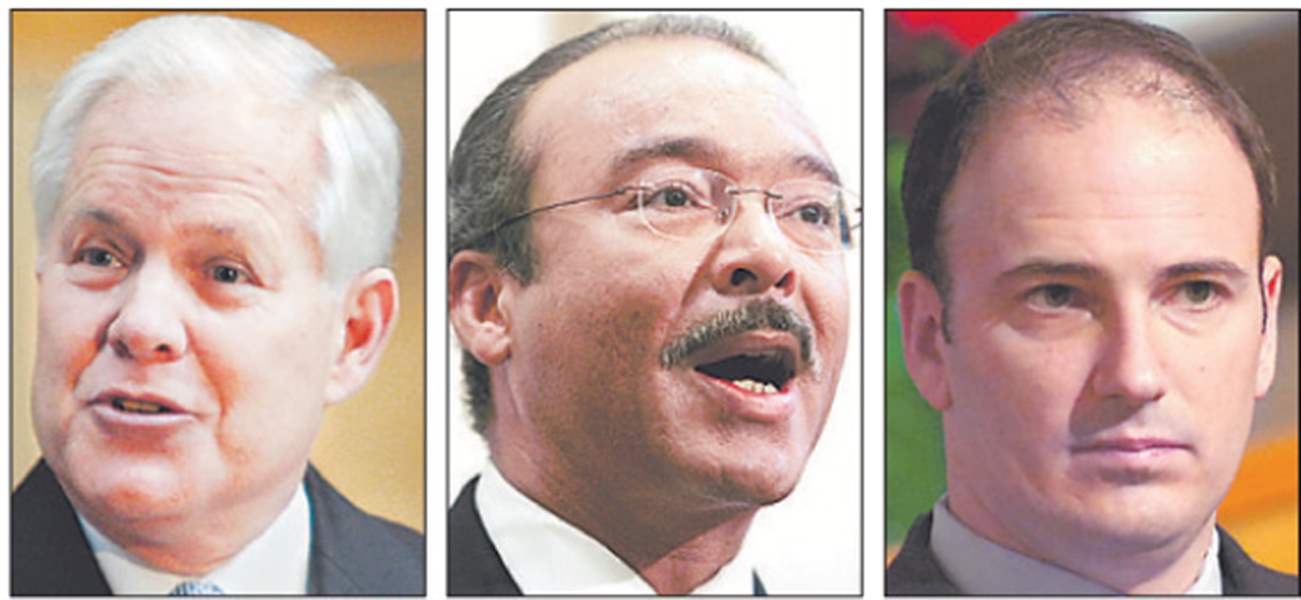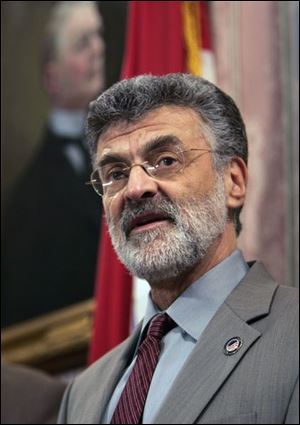
Other Ohio cities face balancing act
3/18/2007
Mayor Don Plusquellic, left, is seeking Akron's first income tax hike in 26 years. Under Mayor Michael Coleman, center, Columbus laid off 30 city workers in 2003. Cincinnati official Jeff Berding said cutting services can drive residents away.

Mayor Don Plusquellic, left, is seeking Akron's first income tax hike in 26 years. Under Mayor Michael Coleman, center, Columbus laid off 30 city workers in 2003. Cincinnati official Jeff Berding said cutting services can drive residents away.
Toledo's not the only city in Ohio digging through its pockets for spare change.
While there is much handwringing and gnashing of teeth at One Government Center over the city's budget woes, other big city governments in this state are suffering similar pains.
Ohio law requires all city governments to pass balanced budgets, so it's the process of making revenues match up with expenditures that hurts the most.
"You do it by tightening your belt," Columbus Communications Director Mike Brown said. "But tightening your belt can be difficult."
Toledo, which is facing an $11.9 million deficit in 2007 and a projected $17 million in 2008, has laid off 23 city employees and has proposed to shut swimming pools, not hire police and firefighters classes this year, and charge residents $6 a month for garbage pickup.
In Akron, Mayor Don Plusquellic is asking residents to vote for the first income taxincrease for city expenses in 26 years. Officials there say the tax hike isn't to combat a deficit, but additional funds are needed to hire more police and boost economic development efforts.
And in Cincinnati, government leaders made about $15 million in cuts this year, with the possibility of more cuts in 2008.

In Cleveland, Mayor Frank Jackson took steps to counter a projected 2007 deficit of $20 million to $30 million.
"You can want all the stuff you want, but if you can't pay for it, you can't pay for it," Cincinnati City Councilman Jeff Berding said. "But at the same time, cities have to grow their way out of these problems, not cut their way out.
"If you continue to cut ser-vices the middle class wants, they will continue to move to the suburbs."
Mr. Berding's point illustrates the basic conundrum facing all those trapped in a budget crisis: How do city leaders increase revenues and decrease spending?
In Columbus, Mr. Brown said the city had flat income tax revenues and increasing budgets during the first part of this decade, causing Mayor Michael Coleman to take action.
He laid off 30 city employees in 2003, sparing police and fire, made a habit of dipping into the city's reserve funds to pay off debts, and insisted the city spend less than it budgeted.
Mr. Brown said Columbus hasn't faced a budget deficit since those layoffs, but the city has had some good luck to help change its fortunes.
Joel Taylor, Columbus' director of finance and management, said the city received a one-time debt payment of $55 million in 2004 from the Solid Waste Authority of Central Ohio that went directly into the city's reserve fund.
Mr. Taylor said the waste authority sold bonds to reduce its debt on a lease with Columbus on a trash-burning power plant.
"Without that payment, that fund would've been depleted long ago," Mr. Taylor said.
Cincinnati's Mr. Berding said that to grow a tax base and increase revenue, a city must make sure its residents are safe and its economic climate is attractive for businesses.
This year and next, Cincinnati will hire 60 new police officers. About $500,000 also was budgeted for a program to tear down dilapidated buildings.
Akron officials said Mr. Plusquellic's proposed tax increase is meant for those same principles - boosting safety and economic development.
Mr. Plusquellic's proposal calls for an income tax boost of .33 percent that would generate about $17 million annually. The revenues would, in part, pay for 25 additional police officers. The money also would go to economic development and assorted capital projects.
Communications Director Mark Williamson said Akron has about 1,600 fewer city employees than it did 25 years ago, though a mayor has not laid off a city employee in 20 years.
"We've created neighborhoods, built homes, and done so much with so little," Mr. Williamson said. "We can no longer provide the things our citizens have grown accustomed to without [the tax increase]."
In 2005, officials in Dayton identified a series of troubling trends they said could lead to a budget shortfall of $90 million by 2010.
To counter the looming crisis, a committee of government staff, local union leaders, corporate representatives, and residents drafted a comprehensive plan to curtail spending and boost development.
Barbara LaBrier, Dayton's budget director, said the comprehensive effort has worked so far but included some painful side effects.
Ms. LaBrier said the city had a projected budget deficit of $9 million in 2006, yet actually ended the year with a $1.6 million surplus.
She said Dayton's strategy is to stem the tide of deficits by a systematic reduction in work force.
Mostly through attrition, Ms. LaBrier said Dayton has cut 510 jobs since 2001, including 78 police positions.
She said the city would reduce its work force by 2 percent each year through 2010.
Ms. LaBrier also said no full-time employees have been laid off since 2001 and only a handful of part-time staff members have received pink slips.
"Whether or not we can continue to do it this way into the future is the question," she said.
Ms. LaBrier said the good news for Dayton is the city would pour $3.5 million into an economic development fund this year and already has $21.3 million in a reserve fund.
The bad news, she said, is a projected shortfall of $11.6 million for this year.
Dayton must also continue to deal with the fallout from Delphi Corp.'s financial troubles, which caused the auto-parts supplier to announce several plant closings in the Dayton area.
The foresight that saved Dayton last year accomplished similar wonders for Cleveland, according to Mayor Frank Jackson.
During his state of the city address on March 1, Mr. Jackson said rising costs and flat revenues were projected to put Cleveland's 2007 budget in a $20 million to $30 million deficit.
So the mayor mandated a 3 percent reduction in costs citywide, which he said saved Cleveland $16.4 million.
"This savings, along with other savings and cost reductions, and a 1 percent increase over budgeted income tax, allowed the 2007 general fund budget to be balanced, averting $20 million worth of layoffs and preserving the jobs of hundreds of employees," Mayor Jackson said during his address.
Like most other heads of cities, Mayor Jackson said he valued public safety and said he would be hiring 30 additional police officers.
Contact Joe Vardon
at jvardon@theblade.com
or 419-410-5055.